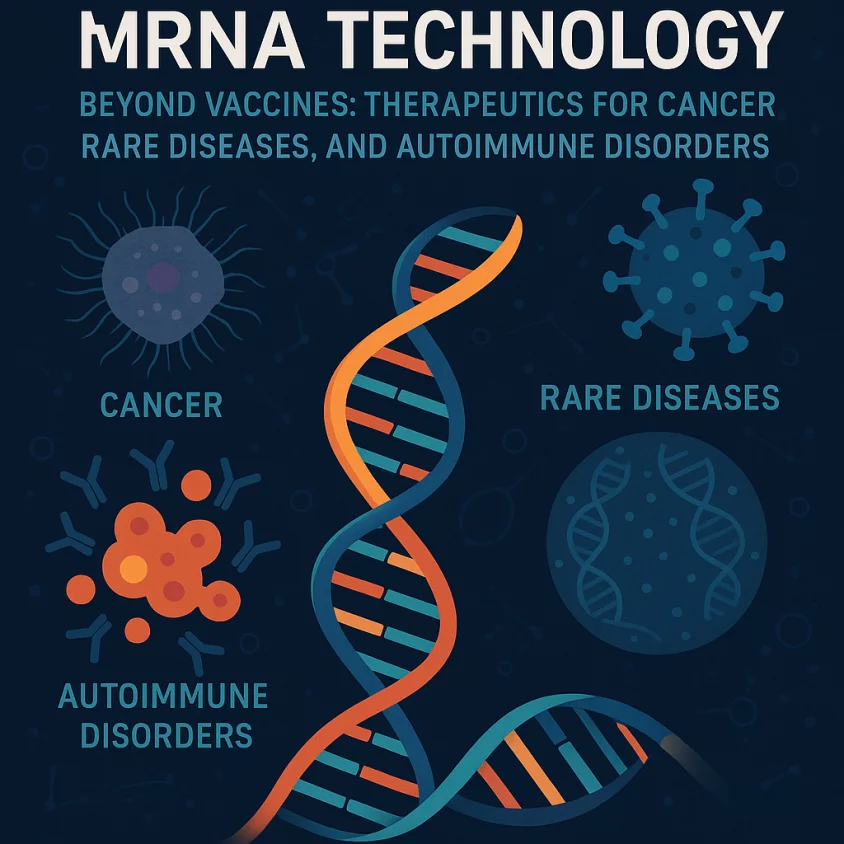The Rise of mRNA Technology Beyond Vaccines: New Frontiers in Cancer, Rare Diseases, and Autoimmune Therapies

Introduction: The mRNA Revolution Enters a New Era
The world witnessed the power of messenger RNA (mRNA) technology during the COVID-19 pandemic when mRNA vaccines rapidly curbed a global health crisis. However, this was just the beginning. Today, mRNA is poised to redefine the future of medicine, expanding far beyond vaccines into cancer treatment, rare genetic disease therapies, autoimmune disorder modulation, and even protein replacement strategies.
With major biotech companies and research institutes accelerating clinical trials, mRNA stands as one of the most transformative forces in modern biotechnology. This article delves into the cutting-edge advances in mRNA therapeutics and their potential to revolutionize healthcare.
1. Personalized Cancer Vaccines: Tailoring Therapy to the Tumor
Perhaps the most exciting frontier for mRNA is in oncology, where personalized cancer vaccines are entering clinical pipelines.
How It Works: mRNA cancer vaccines are designed to encode tumor-specific neoantigens, prompting the immune system to recognize and destroy cancer cells while sparing healthy tissue.
Current Advances: BioNTech and Moderna are leading the charge with promising early results in melanoma and lung cancer trials. These vaccines are custom-made for each patient based on their tumor's unique mutations.
Potential Impact: This approach holds promise not just for treatment but also for preventing cancer recurrence, creating a new paradigm in cancer care.
2. mRNA Therapies for Rare Genetic Diseases
Rare diseases, often caused by single-gene mutations, represent an area of unmet medical need. mRNA offers a flexible platform to restore missing or defective proteins in such disorders.
Key Targets:
Cystic fibrosis
Ornithine transcarbamylase (OTC) deficiency
Glycogen storage diseases
Advantages of mRNA:
Non-permanent expression, allowing repeated dosing
Avoids genome editing, reducing risk
Scalable manufacturing for rare disease populations
Moderna and other biotech firms are currently developing mRNA therapeutics aimed at rare metabolic and enzyme deficiency disorders, with early clinical trials showing potential.
3. Autoimmune Disease Modulation with mRNA
Beyond genetic disorders, mRNA is now being engineered to reprogram immune responses in autoimmune diseases such as:
Multiple sclerosis (MS)
Type 1 diabetes
Rheumatoid arthritis
Mechanism: Instead of stimulating immunity, mRNA can be modified to induce immune tolerance to self-antigens, potentially halting autoimmune attacks.
Breakthrough Example: In 2021, researchers at BioNTech demonstrated in animal models that mRNA could suppress autoimmunity without compromising the body’s ability to fight infections—a game-changing development.
4. Protein Replacement Therapies: mRNA as a Temporary Factory
Conventional protein replacement therapies involve complex manufacturing and intravenous delivery. mRNA offers an elegant alternative by turning patients’ cells into on-demand protein factories.
Applications Under Development:
Hemophilia (blood clotting factor production)
Alpha-1 antitrypsin deficiency
Enzyme replacement in lysosomal storage diseases
Benefits:
Faster development cycles
Lower immunogenicity
Ability to address proteins that are difficult to manufacture synthetically
5. The Next-Generation mRNA Vaccines
Beyond COVID-19, mRNA vaccine platforms are being expanded to:
Universal influenza vaccines
Respiratory syncytial virus (RSV)
HIV vaccines
Cytomegalovirus (CMV)
Companies are also exploring multivalent vaccines that target several pathogens simultaneously, leveraging the modular nature of mRNA.
Challenges and Future Directions
While mRNA technology offers remarkable flexibility, it is not without challenges:
Stability and Delivery: Lipid nanoparticles (LNPs) remain the gold standard but require further optimization for specific tissues.
Cost and Manufacturing Scalability
Regulatory Hurdles for novel therapeutic classes
Long-Term Safety Data collection is ongoing
Conclusion: The Future Is Written in mRNA—and You Can Be Part of It
The post-pandemic era marks the dawn of mRNA 2.0, where this technology transcends vaccines and steps into complex therapeutic domains such as cancer, rare diseases, and autoimmune disorders. As pipelines mature and trials progress, mRNA is set to become a pillar of precision medicine.